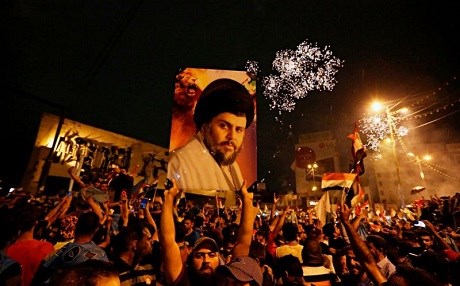The unlikely victory of outspoken Shiite leader Muqtada al-Sadr — beating out rivals Haider al-Abadi and Nouri al-Maliki — brought a glimmer of hope to Kurdish leadership that he would be the right Iraqi leader to deal with. Sadr staunchly opposes the abuse of power and mismanagement by the Dawa Party that has ruled post-Saddam Iraq since 2003 and was unwavering in its policies and mismanagement even prior to that.
Kurdish leaders from KDP wished “his eminence success” in the days after the preliminary official election results were announced.
Sadr who has long favored "grassroots reforms" appeared to call for the formation of a technocratic government in a pun-laden tweet on Monday, suggesting that the next Iraqi prime minister should have no political affiliation.
Sadr has also said that the new Iraqi government's structure shouldn't be sectarian, unlike Maliki's State of Law and Abadi's Nasr (Victory) Coalition which have floated the idea of majoritarianism rule in Shiite-dominated Iraq. Both had lackluster performances in the election on May 12.
Sadr ran on a non-sectarian platform pledging to tackle corruption. His movement locked arms with the Communist Party in the Sayirun alliance.
"Muqtada al-Sadr is a man quite different from other Iraqi Shiite leaders," Arif Qurbany, a Kurdish political analyst and pundit, told Rudaw English. "He has had similar stances — similar to those of Kurds on many occasions and his stances have been for the rights of the people of Kurdistan."
Sadr campaigned against Maliki, just two years after his second term in office with the help of then Kurdish President Masoud Barzani.
Sadr has opposed foreign influence and objected to the US intervention in Iraq in 2003. He and his allies labeled the Americans as "occupiers.” The question is what would the reaction of the US be to Sadr’s victory? The United States espouses less Iranian intervention in Iraq and Sadr is the person who can limit it, argues Qurbany.
"But limiting Iran's influence matters more to the US," said Qurbany, describing Sadr as "the only Shiite who believes Baghdad is the capital of Iraq — not Tehran."
"He is the person who dares to limit Iran's influence over Iraq," added Qurbany.
Sadr’s militia is called Saraya al-Salam and sometimes operates alongside Hashd al-Shaabi. The Iraqi forces supported by Iran-backed Hashd took control of oil-rich Kirkuk after Peshmerga withdrew from the city on October 16.
"Saraya al-Salam was the only Shiite group not involved in attacking or looting Kurdish houses and properties and instead became the protector of them,” said Qurbany. “Hence, I am optimistic that I am going to see a strong Iraq in the future."
Kurds see the occupation as collective punishment for holding a referendum three weeks prior which saw 93 percent of ballots cast choosing ‘Yes’ for independence. Sadr’s post-Kirkuk speeches were not as harsh towards the Kurds as domestic and foreign Shiite leaders.
The cleric for years has organized million-man marches in Baghdad after Friday prayers protesting corruption and asking for reforms in the country. Sadr, himself, has staged multiple sit-ins in Baghdad's Green Zone, actions which forced Abadi to reshuffle his cabinet, make grassroots reforms, and reduce state spending. Amid the ISIS conflict, Sadr didn’t ignore the plight of Iraq’s non-Shiite components.
"This demonstration is the voice of the displaced people and the oppressed Sunnis,” he said over loud speakers on February 26, 2016 after Friday prayers at Baghdad's Tahrir Square. “We disown any corrupt party or personality.”
After Abadi declared ISIS militarily defeated in December 2017, Sadr said the militia groups should hand over their weapons to the state and be incorporated into the Iraqi army.
Before the Iraqi parliament election was held, Sadr had said no party should run under the banner of the Hashd al-Shaabi and again urged for Shiite militias to give their weapons back to the state.
With the preliminary results being so close among front runners, and nothing concrete likely to happen until after Ramadan, Kurds can afford to sit back, listen, and see what guarantees they can receive with regards to the return of the full share of the KRG’s budget, and the return of IDPs and Kurdish security forces to disputed areas. While Sadr’s rhetoric is seemingly pro-Kurdish, it is not in their interest to tie themselves to one candidate this early in the building of a coalition government — a government they have been ignored in under Abadi.


